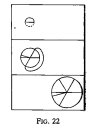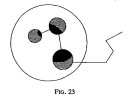"All that has been said up till now refers to real groups connected with real concrete work which in its turn is connected with what has been called the 'fourth way.' But there are many imitation ways, imitation groups, and imitation work. These are not even 'black magic.'
"Questions have often been asked at these lectures as to what is 'black magic' and I have replied that there is neither red, green, nor yellow magic. There is mechanics, that is, what 'happens,' and there is 'doing.' 'Doing' is magic and 'doing' can be only of one kind. There cannot be two kinds of 'doing.' But there can be a falsification, an imitation of the outward appearance of 'doing,' which cannot give any objective results but which can deceive naive people and produce in them faith, infatuation, enthusiasm, and even fanaticism.
"This is why in true work, that is, in true 'doing,' the producing of infatuation in people is not allowed. What you call black magic is based on infatuation and on playing upon human weaknesses. Black magic does not in any way mean magic of evil. I have already said earlier that no one ever does anything for the sake of evil, in the interests of evil. Everyone always does everything in the interests of good as he understands it. In the same way it is quite wrong to assert that black magic must necessarily be egoistical, that in black magic a man strives after some results for himself. This is quite wrong. Black magic may be quite altruistic, may strive after the good of humanity or after the salvation of humanity from real or imaginary evils. But what can be called black magic has always one definite characteristic. This characteristic is the tendency to use people for some, even the best of aims, without their knowledge and understanding, either by producing in them faith and infatuation or by acting upon them through fear.
"But it must be remembered in this connection that a 'black magician,' whether good or evil, has at all events been at a school. He has learned something, has heard something, knows something. He is simply a 'half-educated man' who has either been turned out of a school or who has himself left a school having decided that he already knows enough, that he does not want to be in subordination any longer, and that he can work independently and even direct the work of others. All 'work' of this kind can produce only subjective results, that is to say, it can only increase deception and increase sleep instead of decreasing them. Nevertheless something can be learned from a 'black magician' although in the wrong way. He can sometimes by accident even tell the truth. That is why I say that there are many things worse than 'black magic.' Such are various 'occult' and theosophical societies and groups. Not only have their teachers never been at a school but they have never even met anyone who has been near a school. Their work simply consists in aping. But imitation work of this kind gives a great deal of self-satisfaction. One man feels himself to be a 'teacher,' others feel that they are 'pupils,' and everyone is satisfied. No realization of one's nothingness can be got here and if people affirm that they have it, it is all illusion and self-deception, if not plain deceit. On the contrary, instead of realizing their own nothingness the members of such circles acquire a realization of their own importance and a growth of false personality.
"At first it is very difficult to verify whether the work is right or wrong, whether the directions received are correct or incorrect. The theoretical part of the work may prove useful in this respect, because a man can judge more easily from this aspect of it. He knows what he knows and what he does not know. He knows what can be learned by ordinary means and what cannot. And if he learns something new, something that cannot be learned in the ordinary way from books and so on, this, to a certain extent, is a guarantee that the other, the practical side, may also be right. But this of course is far from being a full guarantee because here also mistakes are possible. All occult and spiritualistic societies and circles assert that they possess a new knowledge. And there are people who believe it.

 ) and should rather shut up and wash the dishes, I don't see it as a bad thing (it is funny to joke, and healthy to laugh)
) and should rather shut up and wash the dishes, I don't see it as a bad thing (it is funny to joke, and healthy to laugh)  and if you want to answer further questions, you can create your own website and do it there.
and if you want to answer further questions, you can create your own website and do it there.

